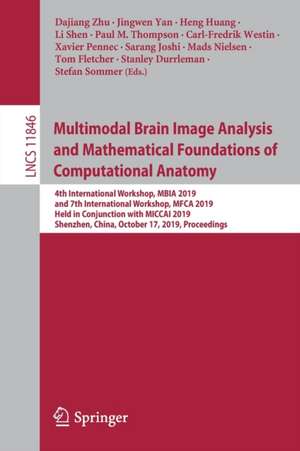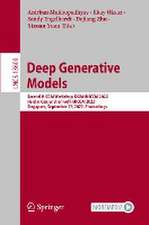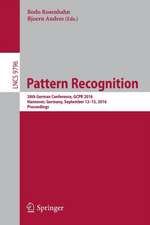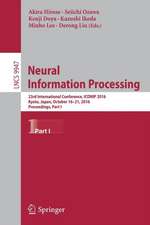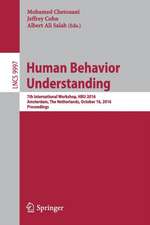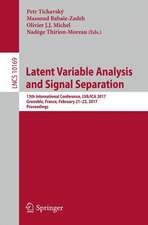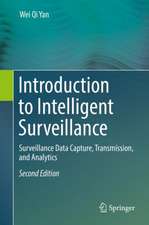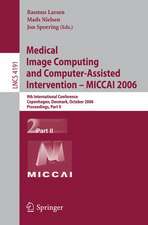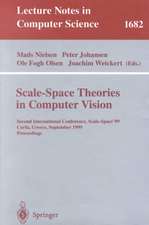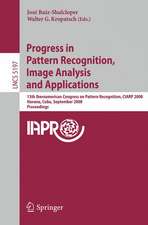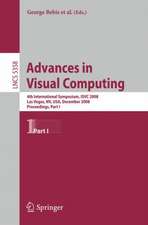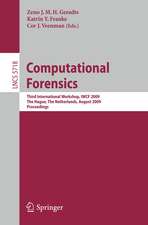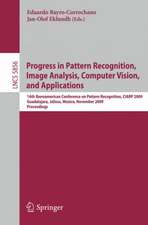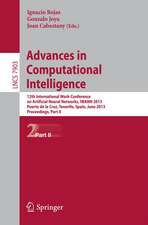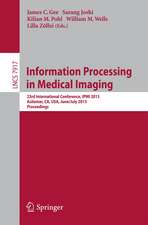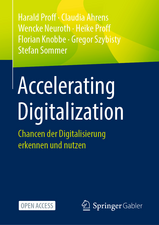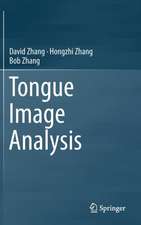Multimodal Brain Image Analysis and Mathematical Foundations of Computational Anatomy: 4th International Workshop, MBIA 2019, and 7th International Workshop, MFCA 2019, Held in Conjunction with MICCAI 2019, Shenzhen, China, October 17, 2019, Proceedings: Lecture Notes in Computer Science, cartea 11846
Editat de Dajiang Zhu, Jingwen Yan, Heng Huang, Li Shen, Paul M. Thompson, Carl-Fredrik Westin, Xavier Pennec, Sarang Joshi, Mads Nielsen, Tom Fletcher, Stanley Durrleman, Stefan Sommeren Limba Engleză Paperback – 11 oct 2019
The 16 full papers presented at MBAI 2019 and the 7 full papers presented at MFCA 2019 were carefully reviewed and selected.
The MBAI papers intend to move forward the state of the art in multimodal brain image analysis, in terms of analysis methodologies, algorithms, software systems, validation approaches, benchmark datasets, neuroscience, and clinical applications.
The MFCA papers are devoted to statistical and geometrical methods for modeling the variability of biological shapes. The goal is to foster the interactions between the mathematical community around shapes and the MICCAI community around computational anatomy applications.
Din seria Lecture Notes in Computer Science
- 20%
 Preț: 1061.55 lei
Preț: 1061.55 lei - 20%
 Preț: 307.71 lei
Preț: 307.71 lei - 20%
 Preț: 438.69 lei
Preț: 438.69 lei - 20%
 Preț: 645.28 lei
Preț: 645.28 lei -
 Preț: 410.88 lei
Preț: 410.88 lei - 15%
 Preț: 580.46 lei
Preț: 580.46 lei - 17%
 Preț: 427.22 lei
Preț: 427.22 lei - 20%
 Preț: 596.46 lei
Preț: 596.46 lei -
 Preț: 449.57 lei
Preț: 449.57 lei - 20%
 Preț: 353.50 lei
Preț: 353.50 lei - 20%
 Preț: 1414.79 lei
Preț: 1414.79 lei - 20%
 Preț: 309.90 lei
Preț: 309.90 lei - 20%
 Preț: 583.40 lei
Preț: 583.40 lei - 20%
 Preț: 1075.26 lei
Preț: 1075.26 lei - 20%
 Preț: 310.26 lei
Preț: 310.26 lei - 20%
 Preț: 655.02 lei
Preț: 655.02 lei - 20%
 Preț: 580.93 lei
Preț: 580.93 lei - 20%
 Preț: 340.32 lei
Preț: 340.32 lei -
 Preț: 381.21 lei
Preț: 381.21 lei - 20%
 Preț: 591.51 lei
Preț: 591.51 lei - 15%
 Preț: 438.59 lei
Preț: 438.59 lei - 20%
 Preț: 337.00 lei
Preț: 337.00 lei -
 Preț: 389.48 lei
Preț: 389.48 lei - 20%
 Preț: 607.39 lei
Preț: 607.39 lei - 20%
 Preț: 1024.44 lei
Preț: 1024.44 lei - 20%
 Preț: 579.30 lei
Preț: 579.30 lei - 20%
 Preț: 763.23 lei
Preț: 763.23 lei - 20%
 Preț: 453.32 lei
Preț: 453.32 lei - 20%
 Preț: 575.48 lei
Preț: 575.48 lei - 20%
 Preț: 585.88 lei
Preț: 585.88 lei - 20%
 Preț: 825.93 lei
Preț: 825.93 lei - 20%
 Preț: 763.23 lei
Preț: 763.23 lei - 17%
 Preț: 360.19 lei
Preț: 360.19 lei - 20%
 Preț: 1183.14 lei
Preț: 1183.14 lei - 20%
 Preț: 340.32 lei
Preț: 340.32 lei - 20%
 Preț: 504.57 lei
Preț: 504.57 lei - 20%
 Preț: 369.12 lei
Preț: 369.12 lei - 20%
 Preț: 583.40 lei
Preț: 583.40 lei - 20%
 Preț: 343.62 lei
Preț: 343.62 lei - 20%
 Preț: 350.21 lei
Preț: 350.21 lei - 20%
 Preț: 764.89 lei
Preț: 764.89 lei - 20%
 Preț: 583.40 lei
Preț: 583.40 lei - 20%
 Preț: 649.49 lei
Preț: 649.49 lei - 20%
 Preț: 341.95 lei
Preț: 341.95 lei - 20%
 Preț: 238.01 lei
Preț: 238.01 lei - 20%
 Preț: 538.29 lei
Preț: 538.29 lei
Preț: 330.10 lei
Preț vechi: 412.62 lei
-20% Nou
Puncte Express: 495
Preț estimativ în valută:
63.17€ • 66.12$ • 52.57£
63.17€ • 66.12$ • 52.57£
Carte tipărită la comandă
Livrare economică 31 martie-14 aprilie
Preluare comenzi: 021 569.72.76
Specificații
ISBN-13: 9783030332259
ISBN-10: 303033225X
Pagini: 230
Ilustrații: XVII, 230 p. 113 illus., 91 illus. in color.
Dimensiuni: 155 x 235 mm
Greutate: 0.35 kg
Ediția:1st ed. 2019
Editura: Springer International Publishing
Colecția Springer
Seriile Lecture Notes in Computer Science, Image Processing, Computer Vision, Pattern Recognition, and Graphics
Locul publicării:Cham, Switzerland
ISBN-10: 303033225X
Pagini: 230
Ilustrații: XVII, 230 p. 113 illus., 91 illus. in color.
Dimensiuni: 155 x 235 mm
Greutate: 0.35 kg
Ediția:1st ed. 2019
Editura: Springer International Publishing
Colecția Springer
Seriile Lecture Notes in Computer Science, Image Processing, Computer Vision, Pattern Recognition, and Graphics
Locul publicării:Cham, Switzerland
Cuprins
MBIA.- Non-rigid Registration of White Matter Tractography Using Coherent Point Drift Algorithm.- An Edge Enhanced SRGAN for MRI Super Resolution in Slice-selection Direction.- Exploring Functional Connectivity Biomarker in Autism Using Group-wise Sparse Representation.- Classifying Stages of Mild Cognitive Impairment via Augmented Graph Embedding.- Mapping the spatio-temporal functional coherence in the resting brain.- Species-Preserved Structural Connections Revealed by Sparse Tensor CCA.- Identification of Abnormal Cortical 3-hinge Folding Patterns on Autism Spectral Brains.- Exploring Brain Hemodynamic Response Patterns Via Deep Recurrent Autoencoder.- 3D Convolutional Long-short Term Memory Network for Spatiotemporal Modeling of fMRI Data.- Biological Knowledge Guided Deep Neural Network for Genotype-Phenotype Association Study.- Learning Human Cognition via fMRI Analysis Using 3D CNN and Graph Neural Network.- CU-Net: Cascaded U-Net with Loss Weighted Sampling for Brain Tumor Segmentation.- BrainPainter: A software for the visualisation of brain structures, biomarkers and associated pathological processes.- Structural Similarity based Anatomical and Functional Brain Imaging Fusion.- Multimodal Brain Tumor Segmentation Using Encoder-Decoder with Hierarchical Separable Convolution.- Prioritizing Amyloid Imaging Biomarkers in Alzheimer's Disease via Learning to Rank.- MFCA.- Diffeomorphic Metric Learning and Template Optimization for Registration-Based Predictive Models.- 3D mapping of serial histology sections with anomalies using a novel robust deformable registration algorithm.- Spatiotemporal Modeling for Image Time Series with Appearance Change: Application to Early Brain Development.- Surface Foliation Based Brain Morphometry Analysis.- Mixture Probabilistic Principal Geodesic Analysis.- A Geodesic Mixed Effects Model in Kendall's Shape Space.- An as-invariant-as-possible GL+(3)-based Statistical Shape Model.
